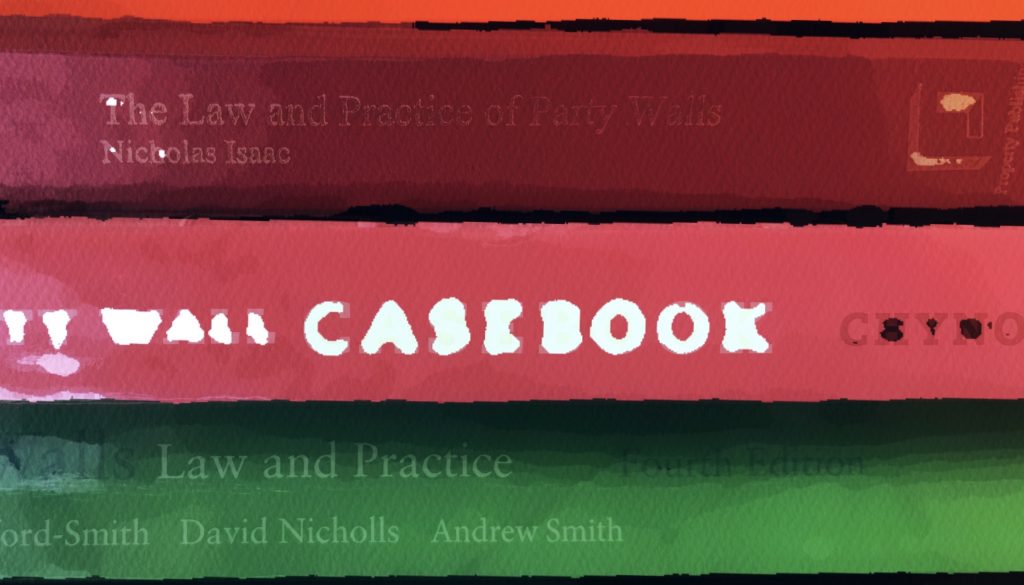Edward H Whybrow Co Ltd v James (5th April 2017)
Transcript here: Whybrow v James 5th April 2017 Central London County Court
Summary:
The adjoining owner (Whybrow) appealed an award which provided for some (completion) works to be carried out by the building owner (the Jameses), and payment to be made in lieu of other making good works, all arising from the building of a first and second floor extension abutting a recent extension at the same levels undertaken by the adjoining owner a couple of years earlier. The Court found that the amount awarded had been too low, but in any event permitted Whybrow to require in the award amended on appeal that the Jameses carried out the making good work, as well as removal of trespassing items of work unapproved by the original award.
Court:
This is a decision of HHJ Bailey at the Central London County Court. It is not, therefore, binding on other county courts, although as a decision by an experienced and specialist circuit judge, having heard argument from experienced and specialist counsel, it is likely to be persuasive in other cases at this level.
Facts:
Approximately 3 years after Whybrow had built its own rear extension, which itself resulted in litigation between the same parties, the Jameses sought to build a rear extension to produce additional residential units for letting. Party structure notices were served and a substantive award was made on 7th October 2014 permitting the raising of the party wall, removal of overhanging projections and incidental works. There were complaints about the quality and nature of work done, including complaints that it exceeded that permitted. A first addendum award was made by the third surveyor on 12th July 2016 dealing with some of these issues, but the award appealed was made by the party-appointed surveyors dated 11th August 2016, requiring some works to be carried out by the Jameses, and providing for them to pay compensation/payment in lieu in respect of other works to Whybrow’s property. The grounds of appeal challenged that award on various grounds, including allegations that it wrongly ignored instances of trespass, and that it had not awarded enough by way of compensation. Immediately before the hearing Whybrow indicated that it now required the Jameses to carry out all of the remedial/repair work themselves, rather than pay compensation/payment in lieu.
Decision:
The judge allowed the appeal. He concluded that Whybrow was entitled to ask the court to require the Jameses to carry out works, and that those works were more extensive (and would be more expensive) than the surveyors making the appealed award had concluded. In making that decision, the judge rejected an argument that the adjoining owner was bound by his decision/election to require payment in lieu. Further, he held that the third surveyor’s award did not make findings/decisions in relation to the works now alleged and found to be a trespass, and so the third surveyor’s award did not bind the parties on those matters. However, on one item, a velux window in relation to which compensation had been sought and rejected in the third surveyor’s award, the judge did consider that the earlier award was binding (even though probably wrong). Finally, the judge amended the award in relation to surveyors’ fees, effectively determining that the “normal” rule, that the building owner pay both surveyors’ fees, be applied. There was, however, a deduction to reflect the adjoining owner’s last-minute change of mind regarding who should carry out the remedial works.
Discussion:
Although one has to look carefully for them, there are a number of interesting points discussed and determined by the judge in this judgment. First, the analysis of the third surveyor’s award is a good illustration of how the court will look at the extent to which an earlier award has determined an issue, and, consequently, the extent to which parties will be bound by that earlier determination. This does involve close consideration of the earlier award. See paragraphs 37-50 of the judgment. Secondly, the extent to which an adjoining owner is bound by his decision to require payment in lieu instead of requiring the building owner to make good damage caused. After lengthy discussion – see paragraphs 55 to 72 of the judgment – the judge concludes that the adjoining owner is not finally bound until that decision is confirmed in an unappealed award (or judgment is given on appeal against such an award)1. Finally, and in circumstances where the building owner’s surveyor had altered the terms of the draft award as to which owner would be paying the adjoining owner’s surveyor’s fees without drawing the adjoining owner’s surveyor’s attention to that change, the judge made it clear that surveyors should draw such changes to the attention of the other surveyor. See paragraphs 86 to 90 of the judgment.His comments highlight the advantages, arguably necessity of using the ‘track changes’ facility when amending draft awards.
